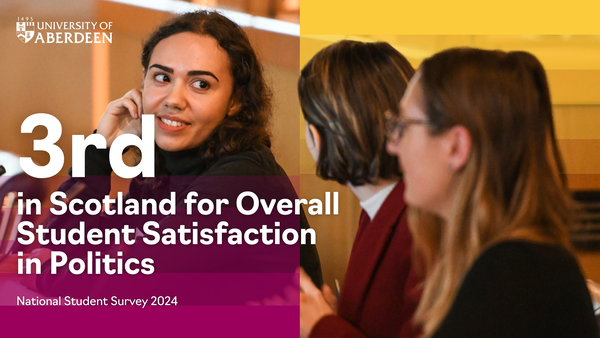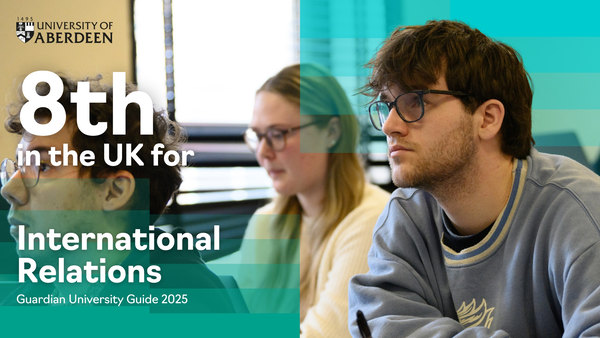
Introduction
This programme combines the strengths of the School of Social Science and the Business School to explore the intersection between money, politics and power and the relationship between international finance and policymaking at the transnational level.
This course has both January and September start dates. Apply Now.
Study Information
Study Options
- Learning Mode
- On Campus Learning
- Degree Qualification
- MSc
- Duration
- 12 months or 24 months
- Study Mode
- Full Time or Part Time
- Start Month
- September or January
- Location of Study
- Aberdeen

This programme is designed to train specialists for careers in the international finance or in the government/non-government (NGO) sectors, where an understanding of global flows of money, trade and labour, and the global distribution of wealth they engender, is required.
Over the last few decades, there has been a steady increase in cross-border financial flows, as a result of the globalisation of financial markets. At the same time, we have witnessed fundamental societal and political changes and how nation-states behave and interact with one another, as well as technological advances and financial innovation.
As a result, businesses, governments, and investors therefore face an ever-growing need to understand the relationship between political relations and international markets.
By combining the key theories and themes in the study of international political economy with corporate finance and investments, this Masters programme addresses the need, by teaching the advanced skills needed to gather, analyse and evaluate information on the politics of international finance and to enable you to communicate how international finance, banking, and stock markets intersect with national and international political events.
The MSc International Finance and Political Relations programme is designed to train specialists for careers in the international finance or in the government/non-government (NGO) sectors, where an understanding of global flows of money, trade and labour, and the global distribution of wealth they engender, is required.
We welcome applications from students from across a wide range of academic backgrounds. You do not need a degree in business or politics to be considered for this programme.
Available Programmes of Study
- MSc
-
International Finance and Political Relations
Qualification Duration Learning Mode Study Mode Start Month LocationMSc 12 months or 24 months On Campus Learning Full Time or Part Time September Aberdeen MoreMSc 12 months or 24 months On Campus Learning Full Time or Part Time January Aberdeen MoreProgramme Fees
Fee information Fee category Cost EU / International students £23,000 Tuition Fees for 2025/26 Academic Year UK £11,100 Tuition Fees for 2025/26 Academic Year Graduates of the University of Aberdeen are eligible for the Alumni Postgraduate Scholarship, which reduces the tuition fee to £7,000, in line with the current tuition fee loan amount offered by the Student Awards Agency Scotland (SAAS). Please see the following for full terms and conditions: https://www.abdn.ac.uk/study/funding/653 Stage 1
Information for part-time students: This route will run over two years. Students can take up to 120 credit points in a single year. BU5093 or IR5905 (dissertations) must be taken in year 2. Between January and August, students must take PD5506 and 30 credits worth of courses from the following: BU5526 (15 credits), BU5575 (15 credits), or SO5512 (30 credits). From September to the following August, alongside their dissertation, students must take the following:
- BU5033 (15 credits) and BU5034 (15 credits) OR IR5007 (30 credits)
- BU5526 (15 credits) and BU5575 (15 credits) OR SO5512 (30 credits)
Following this, from September through to December, students must take 30 credits from the following list: IR5007 (30 credits), BU5033 (15 credits), BU5034 (15 credits).
Compulsory Courses
- Dimensions of Globalization (SO5512)
-
30 Credit Points
This interdisciplinary course focuses on substantive dimensions of globalization by considering recent changes occurring in the economic, political, social, and cultural realms of society. These themes are analysed by considering recent empirical studies, which seek to clarify our theoretical understanding of globalization through advanced social scientific research. The substantive themes covered include global capitalism, the global division of labour, global governance, the changing role of the nation state, transnational social change, and cultural homogenization and heterogenization. Interconnections between these aspects of globalization are highlighted.
- Portfolio Analysis (BU5526)
-
15 Credit Points
This course examines theories and issues relevant to portfolio analysis. Themes include: risk and return; investment motives; the application of modern portfolio theory (including the Capital Asset Pricing Model); information and market efficiency; portfolio analysis and asset pricing; bonds and equities; real estate and derivative markets.
- Financial Analysis and Markets (BU5575)
-
15 Credit Points
Like football, this course is a game of two halves. The first half is financial analysis and builds your ability to analyse companies and think about the implications of financial performance for investors. We will be using Datastream and Bloomberg software. In the second half we will think about how stock markets work and how they are regulated.
- Getting Started at the University of Aberdeen (PD5506)
-
This course, which is prescribed for all taught postgraduate students, is studied entirely online, takes approximately 5-6 hours to complete and can be taken in one sitting, or spread across a number of weeks.
Topics include orientation overview, equality and diversity, health, safety and cyber security and how to make the most of your time at university in relation to careers and employability.
Successful completion of this course will be recorded on your Enhanced Transcript as ‘Achieved’.
Stage 2
Optional Courses
Students must take either one of the two courses listed below (Available only for MSc students)
- Master's Dissertation in Accountancy & Finance (BU5903)
-
60 Credit Points
The capstone of your programme. A significant individual piece of work showing your ability to think, research, organise and analyse. You will work with a member of faculty to develop a proposal that you will then turn into 10,000 words of reality!
- Dissertation in International Political Economy (IR5905)
-
60 Credit Points
​The dissertation in IPE enables students to develop in-depth knowledge of a topic of interest. Under close supervision by an expert on the topic selected, students have an opportunity to frame, develop, research and write a substantive and original thesis on a topic of their choosing.
Stage 3
Compulsory Courses
- International Political Economy: Theories and Themes (IR5007)
-
30 Credit Points
Introduces students to the key theories and themes in the disciplinary study of International Political Economy. Topics covered include global inequality and wealth distribution; financialization and crisis; precarization of work; global regulation of trade, labour, and money; gender, and the environment in the international political economy.
- Issues in Corporate Finance (BU5034)
-
15 Credit Points
This course introduces students to basic financial concepts before moving on to introduce students to a number of areas of corporate finance including investment appraisal decisions, examining capital structure theory, the financing decisions of the firm, and corporate restructuring. The main aim of the course is to equip students with good analytical skills in order to understand the implications of corporate financing decisions by understanding why companies behave the way they do with respect to financing choices and how this interacts with the real world financial markets, and to enable students to understand the theoretical underpinnings of corporate finance theory.
- Economic Analysis (BU5033)
-
15 Credit Points
The course will cover the main elements of Microeconomic Theory together with how this underpins the macro economy, covering consumer theory, how consumers choose under constraint of a budget, to generate demands. How this theory can be used to consider the welfare effects of price changes will be considered. The problem of production will be examined to understand the supply, and the demand and supply side will be drawn together to consider market structure. How the theory can be used to identify market supplies and demands from empirical data will be examined.
Programme Fees
Fee information Fee category Cost EU / International students £23,000 Tuition Fees for 2025/26 Academic Year UK £11,100 Tuition Fees for 2025/26 Academic Year Graduates of the University of Aberdeen are eligible for the Alumni Postgraduate Scholarship, which reduces the tuition fee to £7,000, in line with the current tuition fee loan amount offered by the Student Awards Agency Scotland (SAAS). Please see the following for full terms and conditions: https://www.abdn.ac.uk/study/funding/653
We will endeavour to make all course options available. However, these may be subject to change - see our Student Terms and Conditions page.
Fee Information
Additional Fee Information
- Fees for individual programmes can be viewed in the Programmes section above.
- In exceptional circumstances there may be additional fees associated with specialist courses, for example field trips. Any additional fees for a course can be found in our Catalogue of Courses.
- For more information about tuition fees for this programme, including payment plans and our refund policy, please visit our Tuition Fees page.
Scholarships
All eligible self-funded international Postgraduate Masters students starting in September 2025 will receive an £8,000 scholarship. Learn more about this Aberdeen Global Scholarship here.
To see our full range of scholarships, visit our Funding Database.
Why Study International Finance and Political Relations?
- This is an interdisciplinary programme that combines the strengths of the School of Social Science and the Business School
- There is a strong emphasis on providing a grounding in theoretical foundations of international finance and politics but combined with the key practical analytical skills and knowledge required by businesses, governments, and other organisations
- Learn about the operation of international financial markets in the context of globalisation, global capital flows, and the interconnections between international business and social and political change to understand how the international financial system is affected by contemporary events and changes in international political systems
- Aberdeen is ranked 8th in the UK for International Relations (Guardian University Guide 2025) and 3rd in Scotland for Overall Student Satisfaction in Politics (National Student Survey 2024)
- Learn from experts actively involved in research. The University of Aberdeen is home to several research centres and institutes, including the Centre for Global Development; the Centre for Global Security and Governance; the Institute for Conflict, Transition, and Peace Research; and more
- The University of Aberdeen has been ranked a Top 10 university for Overall Student Satisfaction for four consecutive years (National Student Survey 2021, 2022, 2023, 2024)
- The University of Aberdeen has been ranked 12th in the UK in the Guardian University Guide 2025 and 15th in the Times and Sunday Times Good University Guide 2025.
- Ranked 4th in the UK for Accounting and Finance in the Guardian University Guide 202
- With a community of over 130 nationalities at the University of Aberdeen, students are immersed in an environment that enables international discourse creating truly global exchanges, generating deep insights that spark innovative change.
Entry Requirements
Qualifications
The information below is provided as a guide only and does not guarantee entry to the University of Aberdeen.
Applicants for admission will normally be expected to hold a relevant Honours degree with a 2:1 standard from a recognised university or body. We welcome applications from students from across a wide range of academic backgrounds. You do not need a degree in business or politics to be considered for this programme.
Applicants without this qualification may be admitted subject to having an alternative qualification, or an approved level of work experience appropriate to the field of study. Also taken into careful consideration is the trajectory of results, an applicant without an overall 2.1 but with 2.1 results in their final two years of study may be admitted.
Please enter your country or territory to view relevant entry requirements.
English Language Requirements
To study for a Postgraduate Taught degree at the University of Aberdeen it is essential that you can speak, understand, read, and write English fluently. The minimum requirements for this degree are as follows:
IELTS Academic:
OVERALL - 6.5 with: Listening - 5.5; Reading - 5.5; Speaking - 5.5; Writing - 6.0
TOEFL iBT:
OVERALL - 90 with: Listening - 17; Reading - 18; Speaking - 20; Writing - 21
PTE Academic:
OVERALL - 62 with: Listening - 59; Reading - 59; Speaking - 59; Writing - 59
Cambridge English B2 First, C1 Advanced, C2 Proficiency:
OVERALL - 176 with: Listening - 162; Reading - 162; Speaking - 162; Writing - 169
Read more about specific English Language requirements here.
Document Requirements
You will be required to supply the following documentation with your application as proof you meet the entry requirements of this degree programme. If you have not yet completed your current programme of study, then you can still apply and you can provide your Degree Certificate at a later date.
- Degree Certificate
- a degree certificate showing your qualifications
- Degree Transcript
- a full transcript showing all the subjects you studied and the marks you have achieved in your degree(s) (original & official English translation)
- Personal Statement
- a detailed personal statement explaining your motivation for this particular programme
- Reference x 2
- two reference letters, one of which should be from your university discussing your academic ability. If you have been out of education for a long time you may wish to use your current or most recent employers, or other professional individuals
Aberdeen Global Scholarship
Eligible self-funded Postgraduate Taught (PGT) students will receive the Aberdeen Global Scholarship. Eligibility details and further information are available on our dedicated page.
Aberdeen Global ScholarshipCareers
This programme is aimed at training highly qualified specialists for careers in the international business and finance sector or in government or the non-government (NGO) organisations, where an understanding of global flows of labour, trade and finance, and the global distribution of wealth and poverty they engender, is required.
Our Experts
Information About Staff Changes
You will be taught by a range of experts including professors, lecturers, teaching fellows and postgraduate tutors. However, these may be subject to change - see our Student Terms and Conditions page.
World Class Facilities
The University of Aberdeen, established in 1495, is Scotland’s third oldest and the UK’s fifth oldest University. The university’s ancient campus reflects its long-standing academic tradition, with historic buildings such as King's College, which dates back to the 15th century. This blend of ancient architecture and modern facilities creates a unique atmosphere where students can experience the best of both tradition and innovation.

Sir Duncan Rice Library
The University’s award winning Sir Duncan Rice Library is listed in the “Top 20 spellbinding University libraries in the World”. It contains over a million volumes, more than 300,000 e-books and 21,000 journals.
Find out more
Aberdeen City
Named Scotland's Safest University City (Unbroken Britain Survey, Provident Financial, 2018) and is in the top 10 in the UK for places to live and work (PricewaterhouseCoopers, 2018).

Affordability
Aberdeen has been named the cheapest place for students to rent private accommodation in the UK. In 2024, StuRents reports that the average price of a student private rental property in the Granite City was just over £96 a week.
Get in Touch
Contact Details
- Address
-
Student Recruitment & Admissions
University of Aberdeen
University Office
Regent Walk
Aberdeen
AB24 3FX

